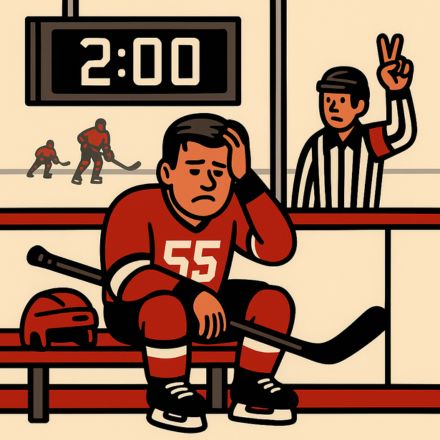The Mayor of the Box
The Penalty-Box Regular knows every official on a first-name basis and has a favourite seat cushion waiting. They patrol the ice with a simple mission: no one touches their teammates without paying interest. Hooks, holds, cross-checks, “accidental” collisions—if there’s an opportunity to send a message, they take it.
Sure, the PK gets a workout, but the bench also stands taller. The Regular’s reputation alone buys space for skill players and sends a warning to chirpy opponents. When the scorer’s table calls their number, they skate over with a smirk, already joking with the timekeeper.
They’re chaos, camaraderie, and a reminder that toughness still has a place in modern hockey—ideally measured, sometimes excessive.
Vitals
Penalty minutes per game: too many to list
Favourite chirp: “The door’s warm!”
Special skill: Can tape knuckles mid-period.
On-Ice Role
Stand up for teammates, clear the crease, make opponents second-guess every bump.
Penalty Box Routine
Chat with ushers, plan next shift, maybe sign a kid’s program through the glass.
Scouting Report
- Physical Presence: Hits through opponents, not around them. Boards rattle, glass shakes.
- Intimidation Factor: Opponents keep their heads up. Space magically appears for star linemates.
- Discipline Challenge: Needs to choose spots wisely. Late penalties can swing games.
- Team First: Will block shots, eat punches, and grin through bruises to protect the crest.
Penalty-Box Chronicles
In a rivalry game, an opponent took liberties with the goalie. Seconds later the Regular separated him from the puck, the stick, and maybe his confidence. Two minutes well spent—momentum flipped and the home crowd roared with approval.
“When he’s in the lineup, we skate a little taller. We just wish he’d give our PK guys a break once in a while.” — Assistant Coach
How to Channel the Penalty-Box Regular
- Play hard, not reckless. Know the difference between enforcing and hurting the team.
- Master body positioning so hits are clean and effective.
- Stand up for teammates, then tap the heart and let them know you’ve got their back.
- Balance the edge with discipline—huge hits feel better when you’re on the ice afterwards.
